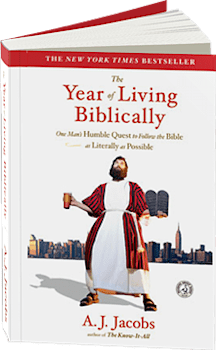Can you be over-religious?
This post is quite different than the normal ones in that it is a bit philosophical and yet not too cumbersome. The post is about my thoughts and ruminations resulting from the hilarious yet thought-provoking book, The Year of Living Biblically: One Man’s Humble Quest to Follow the Bible as Literally as Possible.

About the book
The book is an experiment, a journey and a challenge by the author to spend a whole year by following the teachings of the Bible literally. The key word being literally - no interpretation and no excuses/short-cuts. As the author says on his website, this journey included obeying some well known rules like:
- The Ten Commandments
- Love thy neighbor
- Be fruitful and multiply
However, he came across and followed some of the more obscure ones like:
- Do not wear clothes of mixed fibers.
- Do not shave your beard
- Stone adulterers
The book follows the author’s journey over 365 days (and a few more..) and chronicles the daily struggles the he undergoes to stick true to words of Bible. About 3-quarter of the year is spent on living the tenets of the Old Testament and last quarter on the New Testament. Filled with a lot of episodes that will bring out a chuckle, the author does pose questions that makes you stop and reflect on your life, relationships and struggles.
My Take-aways
I read this book to understand Judaism and Christianity. I had a rough understand that the 2 evolved over time and one was the foundation of the other. However, this book gave a quick and easy to digest overview of the religions.
Secondly, it highlighted the view about growing up secularly. In most cases, it is assumed that you are either a religions right wing conservative or a crazy left wing socialist. This book highlighted the fact that neither a self-confessed agnostic person can’t escape the pull of religion nor a ultra-conservative fundamentalist can follow the religious text to the word.
Finally, it showed the human-quality that makes us all so endearing. For example, the author’s child met fell down and the immediate reaction was to invoke a prayer, although he considered himself an agnostic person.
Another thought provoking question was on generosity. When called to help, do we help because we want or because it says so in some religious book. Moreover, if we are helping someone because of the commandment, does it make our generosity any less? I guess a shorter riddle is, “Can we fake it till we make it?” with even altruism?
Reflection on Hinduism
Like the author, I am not a deeply religious person. However, I do consider myself a Hindu. So I could not help try to draw equivalence between the teachings of Hinduism to the teachings of the Bible. Some of the things stood out:
- Early vedic texts were very quite detailed on the rituals and offerings. This is similar to the teachings in the Old Testament.
- Puranas tend to explain the consequences of our actions and sometimes, they try to dramatize it just like some parts of the Bible.
- Later developments like the Bhakti movement talks about a personal God and self-discovered path to salvation rather than a prescriptive approach. This is very similar to the approach of the New Testament as it focuses on teachings and de-emphasizes the rituals.
Overall, I felt this a great fun to read and time well spent!
Some References
I do follow Sampadananda Mishra for some excellent tweets on learning Sanskrit and quick bites about Hinduism.
